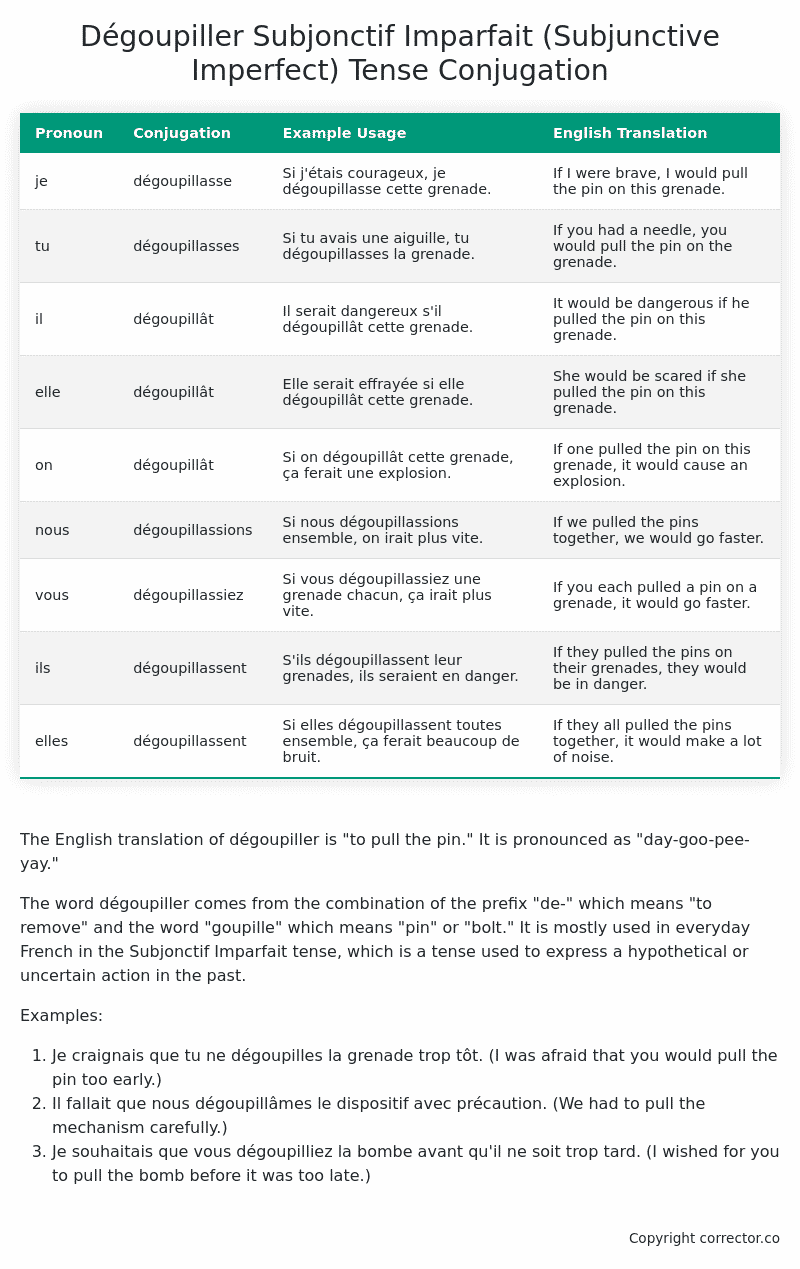Subjonctif Imparfait (Subjunctive Imperfect) Tense Conjugation of the French Verb dégoupiller
Introduction to the verb dégoupiller
The English translation of dégoupiller is “to pull the pin.” It is pronounced as “day-goo-pee-yay.”
The word dégoupiller comes from the combination of the prefix “de-” which means “to remove” and the word “goupille” which means “pin” or “bolt.” It is mostly used in everyday French in the Subjonctif Imparfait tense, which is a tense used to express a hypothetical or uncertain action in the past.
Examples:
- Je craignais que tu ne dégoupilles la grenade trop tôt. (I was afraid that you would pull the pin too early.)
- Il fallait que nous dégoupillâmes le dispositif avec précaution. (We had to pull the mechanism carefully.)
- Je souhaitais que vous dégoupilliez la bombe avant qu’il ne soit trop tard. (I wished for you to pull the bomb before it was too late.)
Table of the Subjonctif Imparfait (Subjunctive Imperfect) Tense Conjugation of dégoupiller
| Pronoun | Conjugation | Example Usage | English Translation |
|---|---|---|---|
| je | dégoupillasse | Si j’étais courageux, je dégoupillasse cette grenade. | If I were brave, I would pull the pin on this grenade. |
| tu | dégoupillasses | Si tu avais une aiguille, tu dégoupillasses la grenade. | If you had a needle, you would pull the pin on the grenade. |
| il | dégoupillât | Il serait dangereux s’il dégoupillât cette grenade. | It would be dangerous if he pulled the pin on this grenade. |
| elle | dégoupillât | Elle serait effrayée si elle dégoupillât cette grenade. | She would be scared if she pulled the pin on this grenade. |
| on | dégoupillât | Si on dégoupillât cette grenade, ça ferait une explosion. | If one pulled the pin on this grenade, it would cause an explosion. |
| nous | dégoupillassions | Si nous dégoupillassions ensemble, on irait plus vite. | If we pulled the pins together, we would go faster. |
| vous | dégoupillassiez | Si vous dégoupillassiez une grenade chacun, ça irait plus vite. | If you each pulled a pin on a grenade, it would go faster. |
| ils | dégoupillassent | S’ils dégoupillassent leur grenades, ils seraient en danger. | If they pulled the pins on their grenades, they would be in danger. |
| elles | dégoupillassent | Si elles dégoupillassent toutes ensemble, ça ferait beaucoup de bruit. | If they all pulled the pins together, it would make a lot of noise. |
Other Conjugations for Dégoupiller.
Le Present (Present Tense) Conjugation of the French Verb dégoupiller
Imparfait (Imperfect) Tense Conjugation of the French Verb dégoupiller
Passé Simple (Simple Past) Tense Conjugation of the French Verb dégoupiller
Passé Composé (Present Perfect) Tense Conjugation of the French Verb dégoupiller
Futur Simple (Simple Future) Tense Conjugation of the French Verb dégoupiller
Futur Proche (Near Future) Tense Conjugation of the French Verb dégoupiller
Plus-que-parfait (Pluperfect) Tense Conjugation of the French Verb dégoupiller
Passé Antérieur (Past Anterior) Tense Conjugation of the French Verb dégoupiller
Futur Antérieur (Future Anterior) Tense Conjugation of the French Verb dégoupiller
Subjonctif Présent (Subjunctive Present) Tense Conjugation of the French Verb dégoupiller
Subjonctif Passé (Subjunctive Past) Tense Conjugation of the French Verb dégoupiller
Subjonctif Imparfait (Subjunctive Imperfect) Tense Conjugation of the French Verb dégoupiller (this article)
Conditionnel Présent (Conditional Present) Tense Conjugation of the French Verb dégoupiller
Conditionnel Passé (Conditional Past) Tense Conjugation of the French Verb dégoupiller
L’impératif Présent (Imperative Present) Tense Conjugation of the French Verb dégoupiller
L’infinitif Présent (Infinitive Present) Tense Conjugation of the French Verb dégoupiller
Struggling with French verbs or the language in general? Why not use our free French Grammar Checker – no registration required!
Get a FREE Download Study Sheet of this Conjugation 🔥
Simply right click the image below, click “save image” and get your free reference for the dégoupiller Subjonctif Imparfait tense conjugation!

Dégoupiller – About the French Subjonctif Imparfait (Subjunctive Imperfect) Tense
Formation
Common Everyday Usage Patterns
Interactions with Other Tenses
Subjonctif Présent
Indicatif Passé Composé
Conditional
Conditional Perfect
Summary
I hope you enjoyed this article on the verb dégoupiller. Still in a learning mood? Check out another TOTALLY random French verb conjugation!


